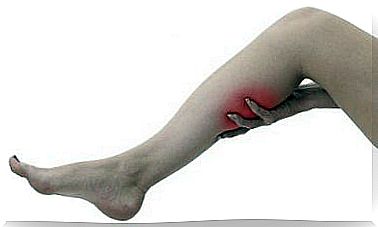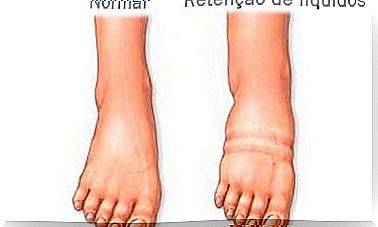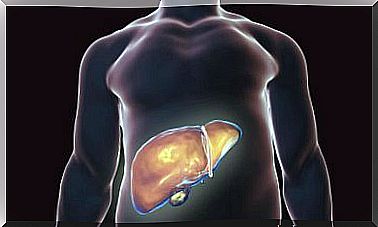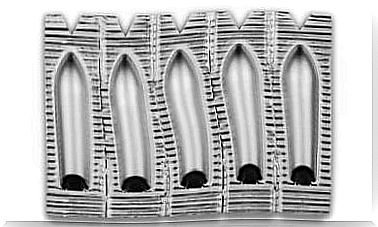Montelukast: Uses, Mechanism And Risks

Montelukast is consumed by millions of people with asthma or allergies worldwide. Of these, about a third are minors.
This medication is used to treat the various symptoms of asthma and seasonal allergic rhinitis. It is considered to be quite effective. However, it has some adverse side effects such as headache and earache, tiredness and weakness.
In this article we will know what Montelukast is, what it is for, how it is administered, its risks and contraindications. Remember that this article is for informational purposes only. Therefore, reading it does not replace medical consultation, which is still extremely necessary.
What is Montelukast and what is it used for?
Montelukast is found in pharmacies, upon presentation of a prescription, under one of its trade names: Singulair ®, Senovital ®, Sansibast ®, Airón ®, Aireal ® or Everest ®.
This is a medication used to combat asthma symptoms such as coughing, wheezing, bronchospasm and chest tightness. In addition, it helps prevent breathing difficulties caused by exercise in people with this disease.
This medication is also used to treat the symptoms of hay fever, known as seasonal allergy or seasonal allergic rhinitis. This condition includes sneezing, nasal congestion, runny nose and itchy nose.
Montelukast generally blocks the action of leukotrienes. These substances, produced by white blood cells and derived from arachidonic acid, have a more potent bronchoconstrictor effect than histamine, causing airway narrowing and inflammation.
Montelukast has been approved by the Food and Drug Administration (FDA). It is used to treat asthma in adults and children aged 6 years and over, and allergic rhinitis in adults and children aged 2 years and over.
It is considered effective and has positive results in reducing symptoms, according to research. However, it does not cure these conditions.

How to take Montelukast?
Montelukast comes in various forms: tablets, chewable tablets and granules. In all cases, it is administered orally. It is not recommended when there are acute or sudden asthma attacks, as it allows only one intake a day.
In the treatment of asthma, it should be taken at night. However, to prevent breathing difficulties associated with this disease, it is preferable to take it two hours before exercise. Ideally, keep to a fixed schedule.
In the case of allergic rhinitis, it can be taken at any time, although under the same conditions: once every 24 hours.
If you are administering this medicine in granules to children, they can be poured into a teaspoon or placed directly in the mouth. The child can drink some fluids after drinking them.
It can also be mixed with a little milk, puree or a little porridge. Ideally, this mixture is made for immediate consumption. After 15 minutes of preparation, it should not be stored.
Do not change the dose or discontinue it unless directed by your doctor or if there is a reaction. Montelukast takes a day to start working.
If you miss a dose by mistake, take it as soon as you remember. However, if almost 24 hours have passed and there are only a few minutes to the usual time, it is advisable to wait and take just one.
Risks and precautions associated with montelukast
Either before starting to take it or during treatment, some precautions must be taken to avoid risks and problems associated with the consumption, storage or disposal of the medication. We will see.
Before starting to take it
Tell your doctor if you are allergic to this medicine, any of its ingredients, or any other medicine. Check which components of the Montelukast presentation you are consuming.
Likewise, you should tell your doctor what medications or supplements you are taking or plan to take. Montelukast may interact with other medications such as phenobarbital, rifampicin and gemfibrozil.
In other situations, such as having suffered from liver disease, being pregnant, planning to become pregnant, or if you are breastfeeding, it is a good idea to see your doctor. So far, no studies have been done in people with kidney failure.
Storage
As with many other medications, montelukast should be kept in a cool, dry place at room temperature. This excludes places that are damp (like the bathroom) or hot (the kitchen).
Likewise, it should be kept as far out of the sight and reach of children as possible. Preferably locked in a high place. This precaution applies even to children who are consuming montelukast on medical advice.
Duration, expiration and discard
Note the expiration date on the package label. In general, the duration is one year. The recommendation is that you avoid consuming expired medications.
Once expired or when treatment is complete, if medications have to be discarded, this must be done safely. Medicines should not be thrown down the drain.
Montelukast Side Effects
Despite the positive results of montelukast, adverse side effects have also been reported. Although they are considered rare, some become serious.
Possible side effects of montelukast include:
- Signs of allergic skin reaction: skin rash, redness, itching, blisters, peeling.
- Throat problems: hoarseness, difficulty in swallowing or speaking.
- Shortness of breath: coughing, wheezing and chest tightness.
- Earache or infection.
- Gastrointestinal complaints: nausea, abdominal pain, watery stools.
- Signs of liver problems: yellow eyes and skin.
- Headache and dizziness.
- Sleep disorders: nightmares, sleepwalking or drowsiness.
- Depression: Clinical studies found that adverse behavioral experiences after the use of montelukast occurred with a prevalence of 2.73%. The research did not reveal cases in which a completed suicide could be directly attributed to the drug.
- Other behavioral disorders: Alice in Wonderland syndrome has been associated with risperidone and montelukast.

Montelukast recommendations and care
The FDA, taking into account the reports of adverse neuropsychiatric events related to the use of montelukast, re-evaluated the benefits and risks of this drug. In this sense, determined that pharmaceutical companies place a warning on the packaging of this drug.
If someone notices any adverse reaction when consuming it, whether physical or behavioral (agitation, aggressiveness, anxiety, irritability), they should seek medical attention immediately and stop using the medication, even if they have never had any prior mental health problems.









